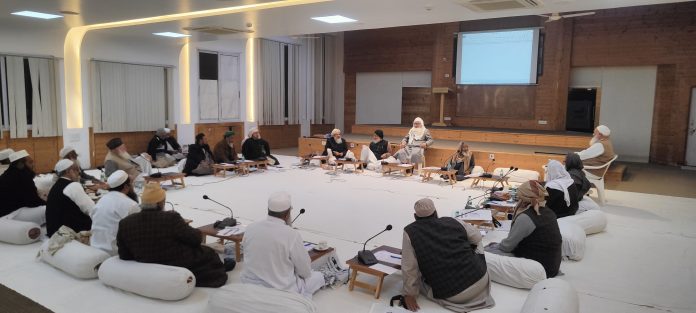– Spl. Correspondent
New Delhi, Jan. 7: Strongly objecting to the flurry of petitions filed against old mosques, the Maulana Mahmood Madani-led faction of Jamiat Ulama-i-Hind on Saturday urged the Union government to uphold the Places of Worship Act, 1991, in letter and spirit. It also raised grave concern over the blatant politicization of the Ram Mandir opening ceremony in Ayodhya and the involvement of the Union and UP state governments.
Passing a couple of resolutions at its National Working Committee meeting held here today, the organization said active participation of the government in the upcoming events in Ayodhya is an attempt to unduly influence the coming general elections. During the WC meeting, a range of issues, including the protection of waqf properties, enforcement of the Places of Worship Act 1991, Ram Temple events, and Israeli terrorism in Palestine, were brought up for deliberation. Resolutions were unanimously adopted on these issues.
In the resolution on Ram Temple celebrations and active involvement of ruling powers, the JUH-WC said:
“In light of the recent events surrounding the Ram temple in Ayodhya, this meeting of the Jamiat Ulama-i-Hind deems it necessary to draw the attention of the government and law enforcement agencies to concerns about the breach of peace and attempts to harass and intimidate the minority community. The escalating atmosphere of animosity within the country is detrimental to its overall well-being. Furthermore, we perceive the active participation of the government as an attempt to unduly influence the upcoming elections.”
Reiterating Jamiat’s stance on the Babri Masjid-Ramjanmbhoomi verdict, it said that the Supreme Court’s judgment on the Babri Masjid does not align with principles of justice. “The decision appears rooted in faith and technicalities rather than the spirit of justice. The Supreme Court itself has acknowledged the absence of evidence supporting the claim that the Babri Masjid was constructed by demolishing a temple.”
This meeting is also concerned that, despite the Supreme Court’s assurance in its Ayodhya judgment regarding strict enforcement of the Religious Places Act 1991, petitions concerning other mosques are still being entertained in several courts. This approach has eroded the citizens’ confidence in the fairness of the judiciary, it added.
Expressing concern over the government’s active participation in the Ram Mandir celebrations, the resolution says, “We urge the government and its institutions to refrain from adopting biased policies. Additionally, we appeal to the citizens of the country to make every possible effort to uphold law and order and maintain peace in these challenging circumstances. Despite provocations, Muslims should remain resilient and patient, not succumbing to despair.”
The meeting also discussed recommendations from the Central Waqf Committee regarding Waqf properties. Emphasizing the systematic struggle to address issues related to the protection of Waqf properties, it was decided to revive the Waqf Department in the Jamiat office and hold the National Awqaf Conference in Hyderabad in February 2024.
The meeting addressed the recently enacted law on mob lynching, forming a three-member committee to conduct a detailed study of various aspects of the law.
Deep grief and concern were expressed over the ongoing genocide in Palestine. The resolution urged the Government of India to use its influence to stop Israeli cruelty and brutality and to implement UN resolutions related to the establishment of a free and independent Palestinian state and ensure the rights of Palestinians. Concerns were raised over the violence in Manipur, attributing it to the failure of the government.
Regarding Jamiat’s position on supporting political parties, the meeting agreed that officials of Jamiat may personally support secular political parties, but the organization as a whole doesn’t endorse any specific political party in an election. It also decided to hold the national governing meeting in Delhi in May 2024.




